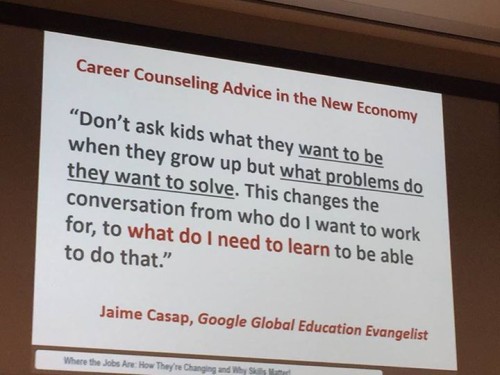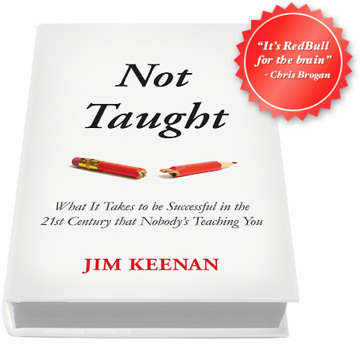
Jaime Casap Google’s Global Education Evangelist crushed it with this observation, and he’s right. It’s time we stop asking kids what they want to be when they grow up. Shit, it’s time we stop asking adults that question too.
Why?
It’s a leading question that drives people to think about who they want to work for or what environment they wish to work in, and although that seems innocuous, it’s rather damning in the 21st century.
The 21st-century economy desires, demands, and prizes problem solvers and asking people what they want to be doesn’t point us in the direction of solving problems, it steers us in the direction of titles, positions, and roles. It does nothing to help us drive value and the 21st-century demands value.
Instead of asking what we want to be, we need to start challenging ourselves and our children with how to identify and solve problems. We need to increase our analytical skills. When we challenge our kids and ourselves to look for problems to solve, we create ownership. By simply acknowledging a problem we are forced accept its existence and ask, do I want to solve this or not? This personal confrontation puts us in the drivers seat. It gives us control. It creates ownership and desired outcomes. What it doesn’t do is allow us to pretend problems don’t exist or walk about blind to the problems around us. When we acknowledge, problems exist it’s harder not to address them.
In my new book, I talk about the importance of solving problems. I talk about it in Chapter 6 (Think) and Chapter 7 (Learn How to Sell). Identifying and solving problems will be the key currency in the new economy. It’s the new currency because solving problems creates value and people pay for value. Jaime is correct. We need to focus on problem identification and what it takes to solve the problems. That’s what companies and customers demand in the new economy.
What also made Jaime’s quote slammin’ was the last part . . . . “What do I need to learn to be able to do that?”
This question is huge. It can not be overestimated. In Chapter 13 I talk about deliberate learning and how essential a well crafted, deliberate learning plan is. We have to own our own our learning paths in the new economy. We cannot learn haphazardly or reactively anymore. We have to take control of our self-directed learning. We need to be clear and strategic in what we learn, why we learn it and how it is applied.
When we are forced to look for and solve problems, it forces us to ask; “What don’t I know? What do I need to know to solve this problem well and where can I get the information?”
We’ve transitioned from the industrial age to the information age. This transition has been marked by the availability and access to massive amounts of data and information. Therefore, those who leverage this access to solve big, fun, necessary, challenging, unique, and unknown problems will be the winners in the 21st-century.
I love what Jaime has said here. He’s right. There is a new economy, and we have an obligation to our children and to ourselves to shift, to adopt the new approaches, methodologies, rules, and skills required to be successful in it.
The new economy is here. What are you asking your kids? Are you preparing them for the industrial age or the information age?
I highly suggest you follow Jaime Casap on LinkedIn.
And,
If you want to understand more about how the 21st-Century and the new economy is affecting your success, order Not Taught today.



